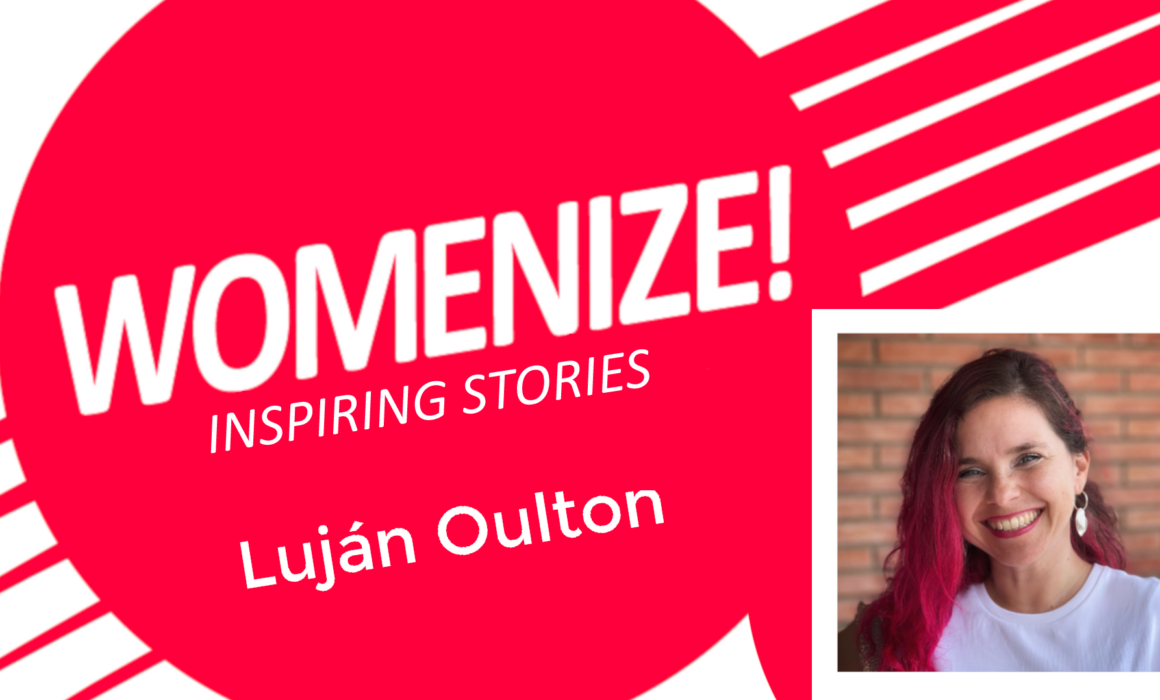Luján Oulton – Womenize! – Inspiring Stories
Womenize! – Inspiring Stories is our weekly series featuring inspirational women from games and tech. For this edition we talked to Luján Oulton, Co-Founder of GAIA. She discusses the future of experimental video games, emphasizes their role in diversity, shares the inspiration behind “Game on! El arte en juego” and “GAIA,” and highlights strategies for fostering female participation in the gaming industry. Read more about Luján in this interview:
Hi Luján! With your extensive experience in the realm of videogames curation and cultural integration, how do you see the future of experimental and artistic videogames in the broader cultural landscape, and what role do you envision them playing in the years to come?
Artistic and experimental videogames have been around for a while now, going through different growth and impact stages in diverse fields. They will strengthen their key role in keeping the game industry alert to a wider spectrum of voices, covering the empty spots that the main industry is missing in regards of representativity and narrativity. In this regard they will also be central to a huge range of gamers and people that enjoy playing and that don’t identify themselves as the archetypal mainstream “gamer”. They have already opened the path to a wave of playful events that work as seedbases and booster spaces and that are engaging wider audiences year after year. They will always hold a valuable place in the realm of artistic creativity and experimentation expanding the possibilities of the medium.
There might be a few opening doors for them in the fields of digital narratives (once again) but this time from a more activist perspective, in regards to citizenship participation.
As the founder and director of “Game on! El arte en juego” and co-founder of GAIA (Game Arts International Assembly), what inspired you to create these initiatives, and what impact have they had so far?
Game on! El arte en juego was born almost at the same time as other game art events, sharing the same curiosity, beliefs and hope in the indie and experimental scene and in the possibilities that were awaiting for those who dared to get out of their comfort zones and explore the medium of video games from a different approach. I was inspired by what was happening in the new media art world scene and by indie game communities like BabyCastle, my own local dev community back in Argentina, by game scholars like Gonzalo Frasca and artists like Tale of Tales.
GAIA‘s birth in 2019 was almost a logical consequence to the growth and evolution of Game on! El arte en juego and of all other exhibitions and festivals around the world. There was a small community of game curators, producers and community organizers that shared the same problems and ideas but didn’t have a shared communication channel. Jim Munroe and I started talking about that and we both had the same idea, we needed to create a dedicated network and place for dialogue, consultation and co-creation. For GAIA, once again the New Media Art history was definitely a place of inspiration, the 90’s disrupt with the net art and the digital divide, writings by Lev Manovich and the Rhizome.org site had a key role into realizing the need to give voice to the game art curator’s community and to reflect in our present and future, to work in a more professional and cohesive way not so isolated.
Given your commitment to fostering female participation in the gaming industry, could you share some strategies or initiatives you’ve been involved in to encourage more women to pursue careers in this field?
Back in 2020 I was part of the founding movement for Women In Games Argentina, the community has tremendously grown since then having now a key role within the Argentinean Game industry scene demonstrating the necessity and importance of creating communities, getting together and working toward shared goals. I always say that Women In Game was born with the hope of not being needed in the future, but for now it is still a necessity, it’s a safe place where women and dissidents can rely on each other, can network, consult, learn, create and grow.
I was also involved in Sheroes in Games, a project run by the Goethe-Institute in Argentina in partnership with other Goethe-Instituts and educational institutions in Latam and Germany. I was the co-producer with Julieta Lombardelli. We were in charge of designing a program to reach out to young girls and get them not only interested in video games but help them realise that videogames are an actual career possibility for women too. We created a gender oriented wiki aimed for teachers and mediators that want to teach videogames to young girls and residences. The project is still alive and is now under the wing of Quilmes University, coordinated still by Julieta.
My lessons from both experiences:
- Create communities
- Get enthusiastic people involved from diverse fields to have a wider view and approach, to get inspired and thinking out of the box
- Be a good listener and be ready to adapt and learn
- Keep doing, even if it’s for a few people. If someone needs it then it’s worth it.
Thanks for this interview, Luján!
Luján’s links: LinkedIn
Womenize! – Inspiring Stories Feature by Madeleine Egger

